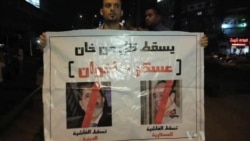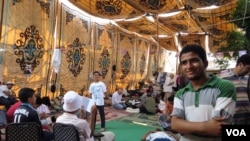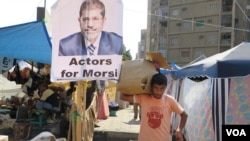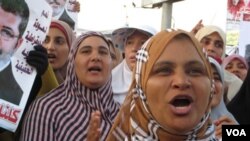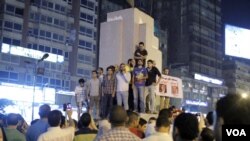CAIRO —
Back in the heady days of the Egyptian “revolution,” protesters called for “bread, freedom and social justice” in Tahrir Square.
Now Tahrir Square is dominated by pro-military demonstrations. Morsi supporters occupy a camp across town near the Raba’a Adiweya Mosque. Both groups claim to be a continuation of the 2011 uprising.
Egyptians across the country are likewise divided between the pro-Morsi and the pro-Army camps.
But a couple of hundred young people camped in Sphinx Square say they have an alternative way.
They call themselves the “Third Square” and reject both the Muslim Brotherhood leadership and the army-appointed interim government. And they say their group is an authentic continuation of the demonstrations in 2011 that led to the ousting of longtime President Hosni Mubarak.
As a protest began this week under a bridge in a commercial district, Ossama Melouk, a student at Cairo University and one of the organizers, held a banner that read “Egypt for All Egyptians".
Melouk said his group does not want Morsi, elected last year, to return to office, but they do want a democracy. He calls the military takeover a “coup.”
“We don’t need Morsi,” he said. “We don’t need the coup, the military coup. We don’t even need the Mubarak regime. We need a revolution to get back again to the right way.”
The “right way” is not yet clear, he said, and the group’s first goal is to gather support. “I can't explain it right now,” he said. “But actually the situation is very confusing right now.”
Unlike the more established protest camps in Cairo, there are no vendors set up in Sphinx Square and no tents for demonstrators to occupy after the rally. The activists appear to be mostly in their 20s and are mostly wearing trendy urban clothing.
Taha el-Sayed el-Homossany, a farmer, stands out in the crowd wearing an olive-colored traditional galabeya robe. He said he was in the area by chance and stopped by to find out what was going on.
Homossany said the country needs to heal after recent demonstrations led to the military takeover and Morsi’s detention by the military.
The young protesters, he said, appear to be wealthy, and not in desperate need of economic recovery, unlike many Egyptians struggling after two and a half years of political strife.
But protester Ghadir Ahmed said Egyptians will not be safe under military rule or Islamist rule. Hundreds of people have been killed since Morsi was removed from office and detained on July 3.
Ahmad said the Third Square is promoting its movement through social media as activists did two and a half years ago.
During a recent demonstration, pink firecrackers lit up the crowd while activists climbed a statue in the square.
“I'm chanting against the Muslim Brotherhood,” they sang. “And I'm chanting against the military.”
Now Tahrir Square is dominated by pro-military demonstrations. Morsi supporters occupy a camp across town near the Raba’a Adiweya Mosque. Both groups claim to be a continuation of the 2011 uprising.
Egyptians across the country are likewise divided between the pro-Morsi and the pro-Army camps.
But a couple of hundred young people camped in Sphinx Square say they have an alternative way.
They call themselves the “Third Square” and reject both the Muslim Brotherhood leadership and the army-appointed interim government. And they say their group is an authentic continuation of the demonstrations in 2011 that led to the ousting of longtime President Hosni Mubarak.
As a protest began this week under a bridge in a commercial district, Ossama Melouk, a student at Cairo University and one of the organizers, held a banner that read “Egypt for All Egyptians".
Melouk said his group does not want Morsi, elected last year, to return to office, but they do want a democracy. He calls the military takeover a “coup.”
“We don’t need Morsi,” he said. “We don’t need the coup, the military coup. We don’t even need the Mubarak regime. We need a revolution to get back again to the right way.”
The “right way” is not yet clear, he said, and the group’s first goal is to gather support. “I can't explain it right now,” he said. “But actually the situation is very confusing right now.”
Unlike the more established protest camps in Cairo, there are no vendors set up in Sphinx Square and no tents for demonstrators to occupy after the rally. The activists appear to be mostly in their 20s and are mostly wearing trendy urban clothing.
Taha el-Sayed el-Homossany, a farmer, stands out in the crowd wearing an olive-colored traditional galabeya robe. He said he was in the area by chance and stopped by to find out what was going on.
Homossany said the country needs to heal after recent demonstrations led to the military takeover and Morsi’s detention by the military.
The young protesters, he said, appear to be wealthy, and not in desperate need of economic recovery, unlike many Egyptians struggling after two and a half years of political strife.
But protester Ghadir Ahmed said Egyptians will not be safe under military rule or Islamist rule. Hundreds of people have been killed since Morsi was removed from office and detained on July 3.
Ahmad said the Third Square is promoting its movement through social media as activists did two and a half years ago.
During a recent demonstration, pink firecrackers lit up the crowd while activists climbed a statue in the square.
“I'm chanting against the Muslim Brotherhood,” they sang. “And I'm chanting against the military.”




